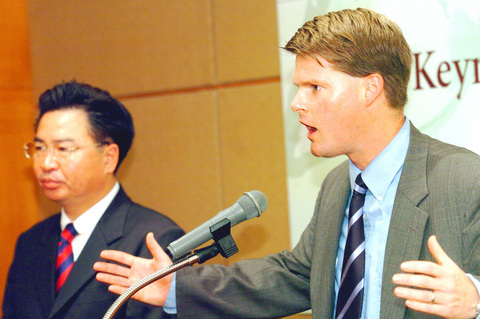The US' preoccupation with the war on Iraq, coupled with the "hyper economic interdependence" between China and the US, has left the US government with less latitude to alter China's behavior, a former top-ranking US official in charge of US-China-Taiwan relations said yesterday.
Randall Schriver, former US deputy assistant secretary of state for East Asian and Pacific affairs said that China's ability to finance US debts in a significant way had limited the US' options in influencing Chinese behavior and had also impacted on decision-making in security matters.
Schriver's comments were part of a luncheon speech to Taiwanese officials and media in a forum for Taiwan-US-Japan Strategic Talks hosted by the Taiwan Thinktank in Taipei. Among those attending were Mainland Affairs Council Chairman Joseph Wu (

PHOTO: CHIEN JUNG-FONG, TAIPEI TIMES
Citing US Deputy Secretary of State Robert Zoellick's description of Sino-US economic relations as "an economic version of mutually assured destruction," Schriver said the US was increasingly losing the leverage to move China in directions that it otherwise would not do, such as making improvements in human rights.
"The success of our economy is so closely linked to China in a very fundamental way that didn't exist a decade ago," Schriver said.
This was particularly the case as "China is financing our debt because they are allowing us to do this deficit spending, allowing us to finance the world without raising taxes."
"When people talk about trying to alter or influence China's behavior, I think certain things have been taken off the table now in a way that wasn't like this a decade ago," Schriver said.
Although recognizing changes in US-China dynamics would impact on the US' decision-making in security matters, Schriver, who is now working with Armitage Assoc-iates, said how this would work would depend on the scenario and would not alter the US' overall commitment to Taiwan.
Schriver also said that the political division between the pan-blue and pan-green camps has seriously undermined the country's ability to uphold nat-ional security, in reference to the long-stalled arms-procurement bill which has been rejected 33 times by the pan-blue dominated Procedure Committee.
"I can't think of another country that has the fundamental division that results in such disputes over what is the primary security threat to the country, and the problem associated with this is the decision to not invest fully in military capability because of a political paralysis," he said.
Schriver said he was not so worried about the expressions of robust democracy and disagreement between parties, which are present everywhere, but about the fact that the resulting paralysis could lead to a tipping point where China might develop the military capability to attack Taiwan without the US being able to defend it.
The former US official also encouraged Taiwan to move beyond its traditional approach to diplomacy by securing a number of diplomatic allies or cultivating ties with US and Japan, to focusing on promoting good global citizenship and regional citizenship as a way to challenge China's growing clout.
"I am afraid the diplomacy of Taiwan has not been sufficiently reoriented given the challenge posed by [China]. The scorecard approach to who has formal diplomatic relations with who and what kind of treatment our friends in Taiwan can get from capitals around the world is the wrong kind of approach for diplomacy in Taiwan," he said.
"There are opportunities to do more of that and again this is a reorientation to deal with what I think is inevitably a losing battle considering [China's] growing clout," he said.

An essay competition jointly organized by a local writing society and a publisher affiliated with the Chinese Communist Party (CCP) might have contravened the Act Governing Relations Between the People of the Taiwan Area and the Mainland Area (臺灣地區與大陸地區人民關係條例), the Mainland Affairs Council (MAC) said on Thursday. “In this case, the partner organization is clearly an agency under the CCP’s Fujian Provincial Committee,” MAC Deputy Minister and spokesperson Liang Wen-chieh (梁文傑) said at a news briefing in Taipei. “It also involves bringing Taiwanese students to China with all-expenses-paid arrangements to attend award ceremonies and camps,” Liang said. Those two “characteristics” are typically sufficient

A magnitude 5.9 earthquake that struck about 33km off the coast of Hualien City was the "main shock" in a series of quakes in the area, with aftershocks expected over the next three days, the Central Weather Administration (CWA) said yesterday. Prior to the magnitude 5.9 quake shaking most of Taiwan at 6:53pm yesterday, six other earthquakes stronger than a magnitude of 4, starting with a magnitude 5.5 quake at 6:09pm, occurred in the area. CWA Seismological Center Director Wu Chien-fu (吳健富) confirmed that the quakes were all part of the same series and that the magnitude 5.5 temblor was

The brilliant blue waters, thick foliage and bucolic atmosphere on this seemingly idyllic archipelago deep in the Pacific Ocean belie the key role it now plays in a titanic geopolitical struggle. Palau is again on the front line as China, and the US and its allies prepare their forces in an intensifying contest for control over the Asia-Pacific region. The democratic nation of just 17,000 people hosts US-controlled airstrips and soon-to-be-completed radar installations that the US military describes as “critical” to monitoring vast swathes of water and airspace. It is also a key piece of the second island chain, a string of

The Central Weather Administration has issued a heat alert for southeastern Taiwan, warning of temperatures as high as 36°C today, while alerting some coastal areas of strong winds later in the day. Kaohsiung’s Neimen District (內門) and Pingtung County’s Neipu Township (內埔) are under an orange heat alert, which warns of temperatures as high as 36°C for three consecutive days, the CWA said, citing southwest winds. The heat would also extend to Tainan’s Nansi (楠西) and Yujing (玉井) districts, as well as Pingtung’s Gaoshu (高樹), Yanpu (鹽埔) and Majia (瑪家) townships, it said, forecasting highs of up to 36°C in those areas